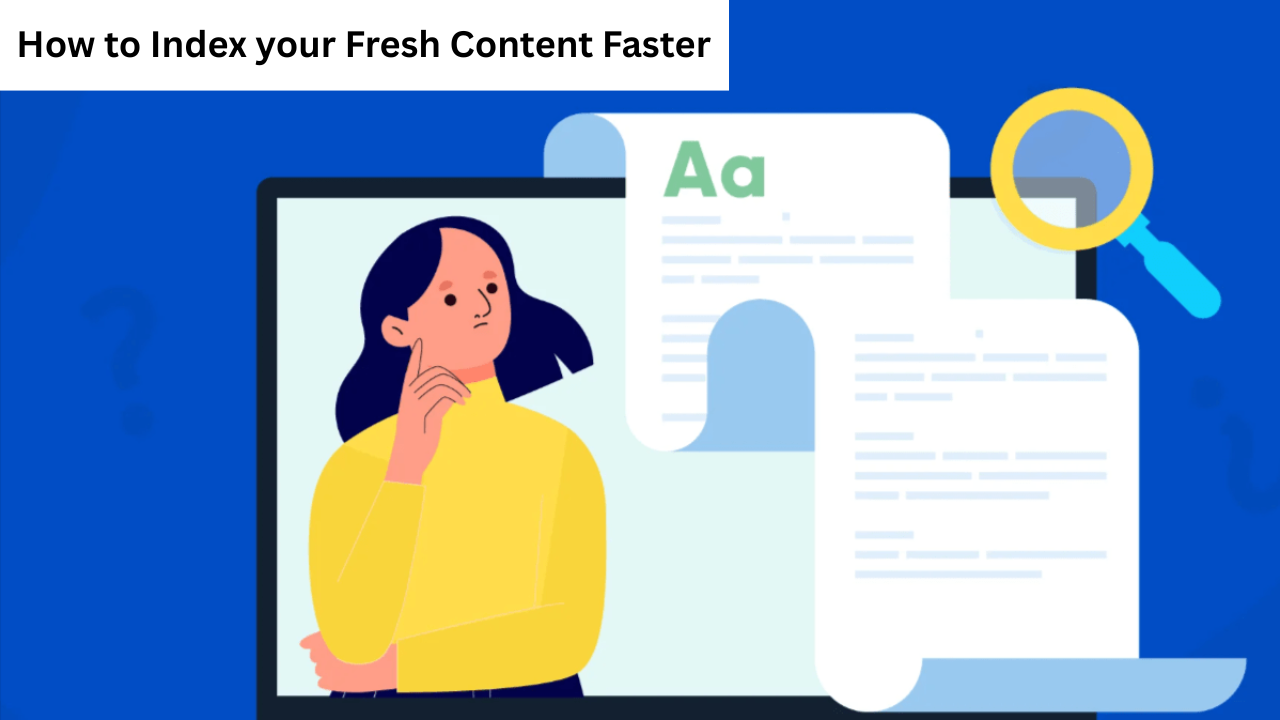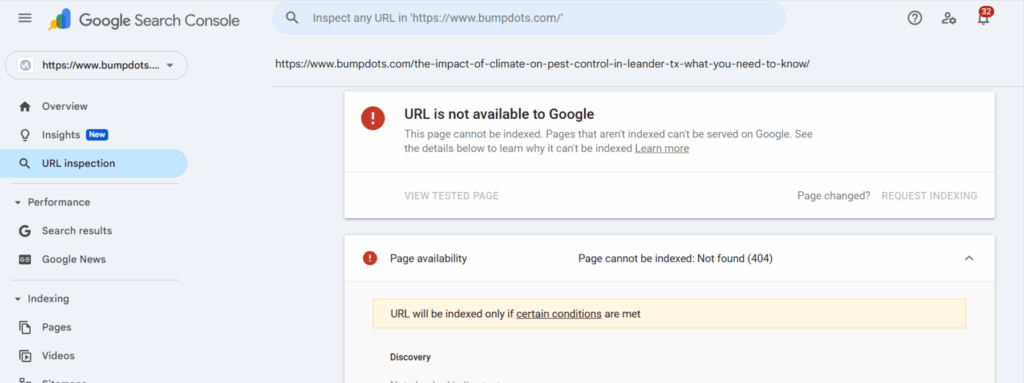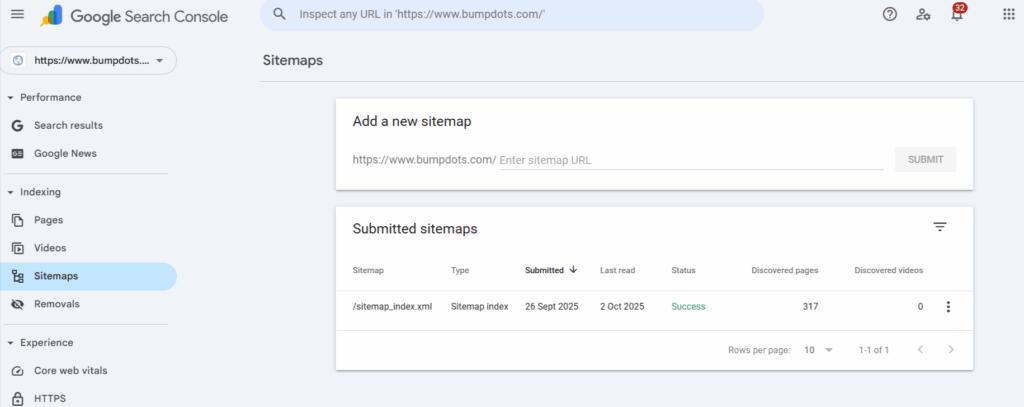
How to Ensure Fast Indexing of Fresh Content on Niche Blogs
- accuindexcheck
- 0
- Posted on
Fast Indexing of Fresh Content : Blogging is all about being in the spotlight as soon as possible. Most people discover websites through engine searches; therefore, new posts must appear on Google the fastest. Even if you write good content, it won’t serve its purpose if it isn’t indexed the instant you hit the publish button.
With niche blogs that are smaller in size, this problem may get more amplified because, simply put, there are fewer visitors, and low authority comes along with that. Once your content starts taking forever to appear in search results, you lose the perspective of masses reading and visiting your site.
In this tutorial, we will be explaining easy yet effective tricks to make indexing quicker so the new posts get popular in less time and reach a great amount of people..
How Indexing Works?
Publishing a fresh blog post will not bring it forth in the search engines. Indexing needs to be done so it can make your content appear in search results. The method goes like this:
- Crawling – Search Engines Discover Your Content
- Google deploys the use of bots known as crawlers or spiders.
- These bots visit your website for new and updated pages.
- The crawlers crawl and follow links from your site or some other websites.
- Analyzing – Understanding Your Content
- The crawlers read your page content, headings, images, and metadata.
- Identify key words and topics.
- Using structured data (like schema) helps the search engine better understand your content.
- Indexing – Storing Your Content
Your page is then included in what is called the search engine index-a massive database of web pages.
Indexed pages can now appear in search results whenever somebody searches for relevant terms.
Why Fast Indexing is Important?
Fast indexing is important because it really affects how soon people can find your blog. Faster indexing means posts begin to appear in search results, so that may lead to:
- Quick Traffic : More readers can discover your content earlier.
- Improved Ranking Possibilities: Through early indexing, the page will compete for top spots in search results.
- Higher Engagement : Early visibility may attract some sharing, backlinks, and interactions on the blog that would increase their authority.
For niche blogs, than indexing speed is a bigger challenge. Since these blogs usually have lower domain authority and fewer backlinks, search engines may take longer to discover new posts. This delay can slow down traffic growth and thus can reduce the actual number of hits your content can make.
Common Reasons Your New Blog May Not Be Indexed Yet
Let’s assume that the post remains new on your blog. You may have even published a fresh post, but it is still not there on Google’s search. This is a common issue while starting off with new on blogging. You will know several reasons why your content takes longer to get indexed and by doing so, fix the problem so that the posts can be seen sooner.
Low Domain Authority
New blogs may face indexing delays because search engines consider verified and trusted sites first. If a site’s domain authority remains low, it is not likely to be crawled regularly, so, new posts can remain hidden from search results in a matter of days or weeks. Crawlers have more preference for mature sites with a good history of quality content and regular updates than new blogs that have to put in more effort for getting noticed.
Missing or Wrong Sitemaps
Imagine the sitemap to be the search engine’s map showing all of your pages and posts on your website. If your sitemap doesn’t exist or has become outdated, or for that matter, just bad, search engines will simply fail to find content and hence indexing is delayed! Many new bloggers don’t even bother with sitemaps, thinking that search engines will find every post themselves, but that is usually not true.
Bad Internal Linking
Internal links are extremely important to move the search engine crawlers from one page to another. If new posts are not linked from existing posts, from menus or from category pages, crawlers may have a hard time finding them. This is mostly the case with niche blogs that focus on just a few themes but still do not have a solid internal linking structure.
Duplicate or Thin Content
Search engines favor sites that offer unique and relevant content for their users. If your blog posts are short, repetitive of just a few other posts on your website, pages on the internet, maybe even duplicate content, they may be ignored or go in slow indexing. This is a big problem for nascent bloggers who trough in many of their posts with template content or with content repurposed for something else without enough original value. In other words, thin content.
Technical Issues or Crawling Errors
Sometimes the problem with indexing is not about content quality but rather about technical obstruction. Any page blocked by robots.txt, tagged with noindex, or affected by server errors is denied access to search engines. Pages that load slowly or show broken links, and we might as well forget heavy uses of ads or script bars on them, could also become a nuisance for crawlers not to read content clearly.
Lack of Backlinks or External Signals
Backlinks work as signals to show search engines the importance and relevance of your content. Since starting blogs have a very limited number of backlinks, this means crawlers would take some time to prioritize the posts. Without these external signals, your content remains ignored, although it is of top-notch-quality and value.
Inconsistent Posting Schedule
Websites that update often tend to get crawled more frequently. If your blog has long gaps between posts, crawlers may visit less often, hence hindering the fast indexing of new content. New blogs often come across this challenge because they are still working with a consistent content rhythm.
Over-Use of Low-Quality Plugins or Heavy Ads
Most new bloggers install many plugins or use any ad-heavy templates available to upgrade either functionality or monetization. Unfortunately, poorly coded plugins, too many scripts, or heavy ads can definitely slow down your site, and some may outright block crawlers from reading your content. Slow or cluttered pages are adverse to search engine processing, hence the delayed indexing.
Traditional Methods of Indexing Your Pages
To score in the eyes of Google, the first step is to get your content indexed. Following are some of the generic methods and practices that you should try:
Manual Submission via Google Search Console: You can simply submit URLs of new or updated pages and directly inform Google. This works well if you only occasionally publish a few posts, but it becomes untenable with multiple posts or in frequency.

Using XML Sitemaps: Sitemaps will display all pages of your website so search engines have a roadmap to follow. When submitted, it certainly will quicken the speed that crawlers get to your content; however, this is no guarantee that your site will be indexed instantaneously.

Backlinks from Trusted Sites: If you link from high-quality, trusted sites to yours, search engines would consider your content important and can perhaps lead to faster indexing. However, gaining linkback is an uphill task and requires a lot of time and effort.

Social Media Promotion: Advertising your post on social networking sites may assist search engines in discovery sooner. This promotion will actually amplify visibility, but the effect on indexing speed tends to be varied.
Ping Services: Some bloggers use pinging tools or services to alert search engines when new content is published. Pinging can activate faster crawling, but its efficiency depends on the specific search engine and site’s regarded authority.
Optimizing the Indexing Speed Using Google Search Console

Google Search Console (GSC) is an excellent utility, functioning as a watchdog in making sure pages from your website get indexed promptly by Google. Once everything is rightly done, even the new post will be indexed quickly.
Submit Your Sitemap: Start by submitting the sitemap of your site to Google Search Console. It is a map from Google’s perspective of your site and hence makes it easy for the search engines to find and index all pages.
Track Page Indexing: Check regularly in GSC the status of pages. You can see which posts have gone into the index and which have not made that grade yet. Suppose some important pages are not indexed, then one can diagnose and fix all the related issues right away.
Use the URL Inspection Tool: The URL Inspection Tool allows administrators to immediately request indexation for any new or updated post/application/website by simply entering the URL. This will help to boost crawl priority for that particular page in Google which is good for emergency news or very fresh content.
Identify and Resolve Errors: Check your blocking from the crawl. GSC will report errors such as broken links, server errors, noindex pages, etc. Fixing these will help ensure smooth crawling of your content.
Request a Fetch: With Fetch as Google, you can make Googlebot visit specific pages on your own site. This feels like forcing search engines to review and approve your content faster than the regular crawl schedule.
Improve Site Performance: The speed at which your pages load correlates with how fast Google could crawl and index your posts. Making your site faster should be one major task of following all recommendations Google Search Console has so that your sites will be indexed faster with better visitor experience.
10 Tips for Fast Indexing of Fresh Content on Google
Once your posts are indexed faster on Google, they start fetching traffic. Plenty of practical tips to get your content to appear shorter in search results include:
- Submit Your Sitemap: Upload your XML sitemap through Google Search Console. Consider that a roadmap that guides Google in locating all pages on your website efficiently. Every time a new post is added to the blog, keep it upright in case search engines should be notified therein.
- Keyword Optimization: Put keywords naturally in the content. Relevant keywords reinforced by the title and heading and all throughout the content pertaining to your niche will make site engineers understand and recognize which keyword will give your posts grew on a more fertile or on a priority to better attention.
- Mobile Optimization: The blogs should be optimized to be accessed from the mobile. Mobile-optimized pages get a preference for crawling and indexing from Google as most users access content via smartphones and tablets.
- Image Optimization: Images should be optimized with descriptive filenames and alt text. Properly optimized images increase the indexability of your pages and hence your SEO as much as the crawlers can interpret your content.
- Internal Links: Link new posts from older posts of related content. Internal links direct crawlers towards your newer pages and enhance overall site navigation, and thus expedite the indexing of your content by Google.
- Build Backlinks: Advertising on third-party websites, guest posting on uncommon sites, and including mentions on forums are all ways of letting search engines know that the content is valuable. Those few new backlinks should fast-track your indexing.
- Posting Content on Social Media: Each time an article or blog post is published, it should immediately be shared on Facebook, Twitter, LinkedIn, Pinterest, and so forth. Of course, sharing on social media will provide more visibility for the article or blog post, and sometimes, it may even expedite the crawl time of the search engines.
- Optimize Page Speed: Fast websites tend to be crawled and indexed fastest. Use Google PageSpeed Insights to find out what’s killing your web speed and work on speeding it up for the users and the search engines.
- Keep Your Updates Regular: Maintain your blog actively, which means either maintaining or refreshing older posts on a fairly regular basis. Frequent updates are a sign to search engines of activeness to some extent, which surely means they will encourage crawlers to visit more often and index new content faster.
- Check Crawl Errors: Use the Google Search Console to keep an eye on the crawl errors or any pages blocked. Fix any issues like broken links, very slow pages, or no-index tags so that all posts may be indexed.
In conclusion
Promptly being indexed by Google powers your blog posts with visibility and consistent traffic, which is a real need. To make your blog visible to search engines, it is compulsory that you practice some tried-and-true techniques such as sitemap submission; keyword optimization; mobile and image optimization; fast page speed; backlinks building; and regularly updated contents.
Following them forever would make it much more likely for an index to be fast, better in rankings, and good for site performance. Your application of these methods would immensely make your niche blog highly attractive to Google and in turn lead your content to its target audience.
FAQs
How do I index my blog content fast?
To index a blog within soon after a day, you need to submit your sitemap into Google Search Console, interlink any new posts, share the content on social media, and generate good-quality backlinks. Applying minor Page Speed Optimization and Mobile-Friendly Designing would also place some importance on your posts.
How to speed up indexing time?
URL submissions through Google Search Console, updating your sitemap, fixing crawl errors, and creating original and top-quality content are the things you should do if you want to accelerate indexing. Apart from this, an excellent method to tell search engines to crawl your site sooner is by backlinking to your site and sharing posts on social media.
How does one index Blogger posts on Google?
The Blogger post URLs must be submitted in the Google Search Console using the URL Inspection Tool. Also, make sure that your blog sitemap is properly submitted, that there are good internal links to your post, and that there is neither a noindex tag nor a technical glitch preventing crawlers.
How much time does Google take for indexing a website?
Google usually indexes new sites under a few days and up to a few weeks, subject to the site factors such as authority of the domain, quality of content, internal linking, and structure of the site. The period, however, reduces when placed under constant updates, sitemaps, and backlinks.
Why are my pages not being indexed?
Pages get no-index when the domain authority is low or sitemaps are missing or wrong or the contents are either duplicate or thin and there is poor internal linking, or technical glitches block crawling, like noindex tags, broken links, slow page speed. Fixing all these ensures better discoverability and faster indexing.